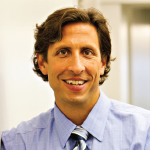The time commitment to many may seem insurmountable, but when we really work together in a team environment, it’s very doable on nights and weekends. —Peter Belafsky, MD, MPH, PhD
Explore This Issue
December 2019
The win–win situations are really what you have to build on and continue to grow, where two people engage in an endeavor, and both people benefit from that engagement, and it makes both people stronger. It’s developing a way to share equity fairly between two partners or to make sure everybody gets the appropriate amount of credit when they work on a project, or everybody’s up front and everyone knows that the time that they’re spending, they’re all going to get something that gives everybody a return on investment.
Team Effort
 Peter Belafsky, MD, MPH, PhD, director of the Center for Voice & Swallowing at the University of California, Davis, is chief medical officer with VisiTube, which is developing a way to use endoscopy to place feeding tubes more safely and prevent deaths from misplacement in the lungs. The company is also developing a pump to help patients with PEG tubes deliver nutrition to themselves more easily and discreetly. He is also a co-founder of Reflux Gourmet, which has developed an all-natural alginate product to prevent and help with symptoms of acid reflux. In that venture, he has partnered with Ken Frank, a chef and also a reflux patient, and Ramon Franco, MD.
Peter Belafsky, MD, MPH, PhD, director of the Center for Voice & Swallowing at the University of California, Davis, is chief medical officer with VisiTube, which is developing a way to use endoscopy to place feeding tubes more safely and prevent deaths from misplacement in the lungs. The company is also developing a pump to help patients with PEG tubes deliver nutrition to themselves more easily and discreetly. He is also a co-founder of Reflux Gourmet, which has developed an all-natural alginate product to prevent and help with symptoms of acid reflux. In that venture, he has partnered with Ken Frank, a chef and also a reflux patient, and Ramon Franco, MD.
ENTtoday: Would you have become involved in entrepreneurship if not for the personal clinical observations that you felt would really help patients?
Dr. Belafsky: There’s no way. My passion in life is to treat patients and improve their health, well-being, and quality of life, and I just feel very fortunate to be in a part of the world where innovation is encouraged and promoted and supported…. I’m at an institution in a part of the country that says, ‘What do you need to see your idea through to completion?’ ‘What can we do to help?’”
ENTtoday: How have you been able to balance your clinical work with your entrepreneurial projects?
PB: We have the world’s knowledge base at our fingertips, immediately available on our mobile devices. So all of the time that would be spent on acquiring knowledge is now freed up for us to pursue other projects. If I see something in the clinic for a patient I’m not sure of, I can research that on the Internet in three minutes—whereas my parents’ generation would be in the library trying to pull articles and figure out how to help this person. Really, for us to succeed, our generation and our kids’ generation, it’s all about innovation and working in teams. So we’ve been able to develop these teams, and when we work together, the individual work is dramatically amplified by the productivity of the team.
The time commitment to many may seem insurmountable, but when we really work together in a team environment, it’s very doable on nights and weekends.
ENTtoday: How do you go about assessing the risk–benefit in these kinds of projects? How do you know when it’s worth going for it?
PB: I think there are a couple ways to evaluate this. The first is, what’s the risk to the patient for not doing it? Is somebody else going to do this? With our feeding tube company, I mean literally there are four people dying every year at every major medical center because a feeding tube is put blindly into their lung, and nutrition is being administered through that. The risk to the patient if we do nothing is death. So I’ve been fighting like heck to get this device to market because we can save somebody’s husband or save somebody’s child.
With regard to finances, it’s really just a matter of what resources you can devote to this, and I think that’s just an individualized notion. I’ve taken money out of my retirement on both (VisiTube) projects and haven’t earned a penny from either. I luckily have been pretty diligent about saving for my children’s college funds, but my retirement is definitely a risk. You just have to have faith in your mission and your team.
ENTtoday: What are some factors that might work against pursuing an entrepreneurial venture?
PB: Innovation is, in general, a game of the young. As you get older, your creativity persists and can even become more creative, and you can teach and promote creativity as you get older. But experience breeds out risk. So people come a long way to see me to take care of their swallowing problem because of my experience. They know that they’re going to expect a certain outcome, and I know what works, I know what doesn’t work. That experience leads me to be risk averse. When you’re earlier in your career, you don’t know what works and what doesn’t work, and a crazy idea is only crazy until it works. So you’re much more likely to try new things earlier in your career. As you get older, you need to force yourself to continuously innovate, and not just reinvent yourself, but to continuously reinvent the healthcare you’re delivering to improve outcomes and improve health.